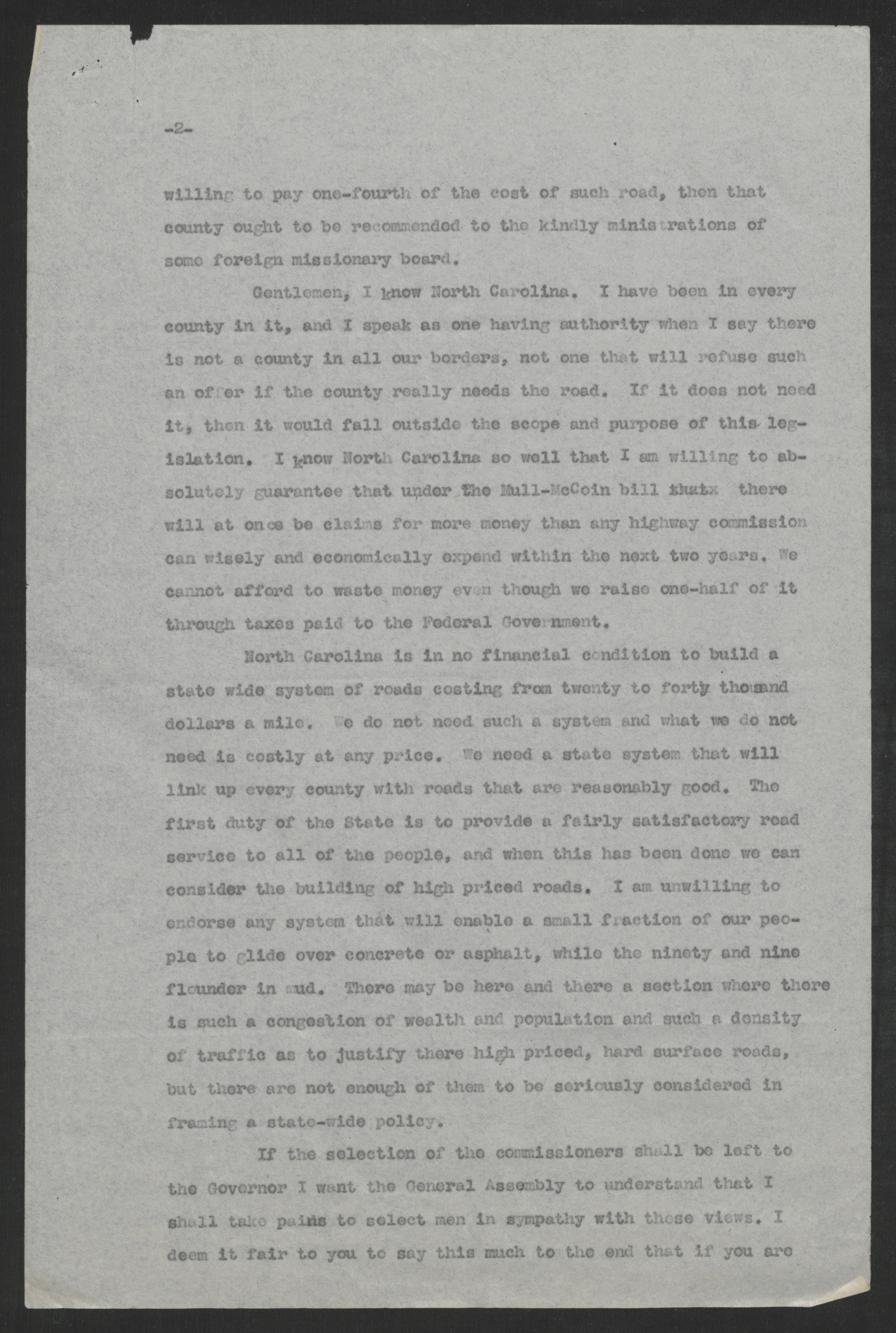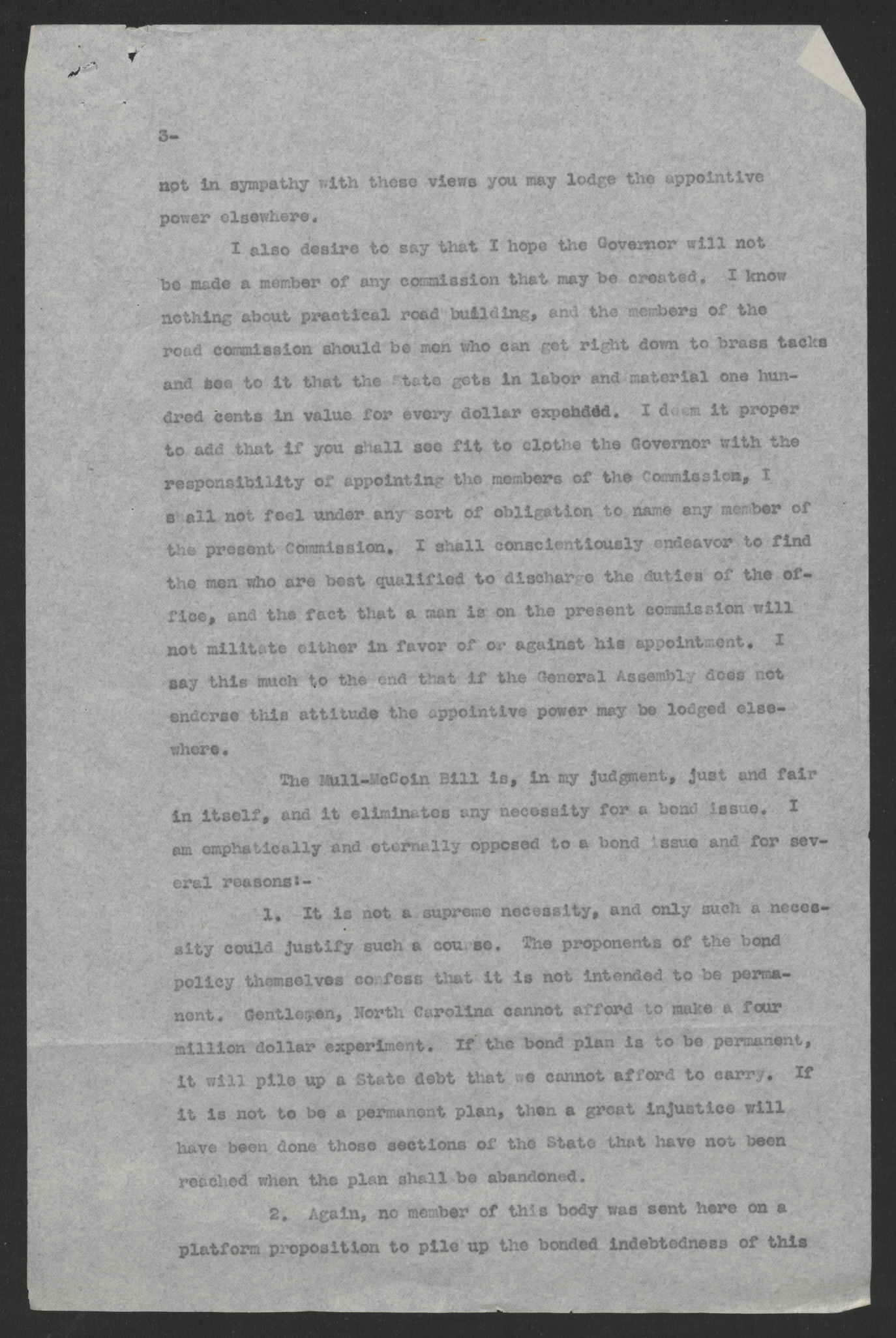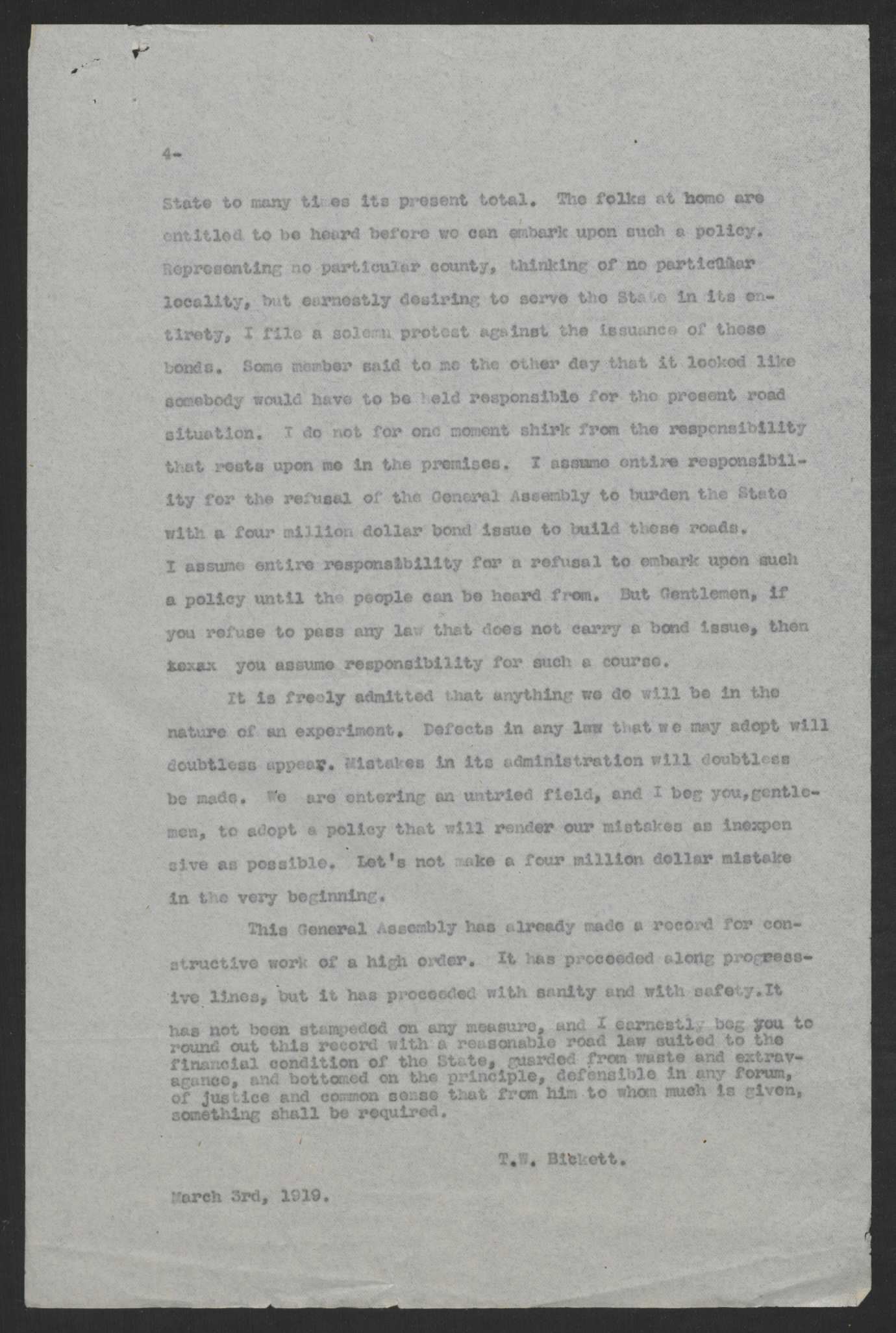March 3, 1919
Gentlemen of the Assembly:-
If the General Assembly were not in session, and some stranger should appear in any county in North Carolina and say, “I see that your county has no good road connecting it with the surrounding counties. This is a serious disadvantage to the people of your county, and if you would like to link up with the outside world and become a part of the system of roads that would connect you with every other county in North Carolina, I will put up three-fourths of the cost of such road or roads, if you will put up one-fourth.”
I am satisfied that the attitude of any county in North Carolina to such a proposition would be the same as the attitude of Zeb Vance on a certain occasion. The story runs that while Vance was a member of the General Assembly some member arose one day and said that there was a man in Raleigh who proposed to build the Western North Carolina Railroad from Old Fort to Asheville. Vance immediately rose from his seat and exclaimed:- “Mr. Speaker, I move that we do now adjourn and go out and catch that man.”
It is passing strange that because this identical proposition is made by the State instead of an individual there is a disposition on the part of some members from counties who would reap the largest benefits to reject the proposition because the offer is not made to put up all the money instead of three-fourths. This attitude is not unlike that of the pauper who was being carried to the poor house. A kind hearted stranger said to the driver of the wagon, “Why are you carrying this man to the poor house”? Said the driver, “Because he is so poor that he has not got a bushel of corn.” The pauper looked up and inquired, “Is it shelled?” “No,” said the stranger, “it is in the ear.” Said the pauper, “Drive on.”
God Almighty will not help a man who refuses to make a reasonable effort to help himself, and if there be a county in North Carolina so dead to the desirability of a good road that will link it up with the balance of the State as to be unwilling to pay one-fourth of the cost of such road, then that county ought to be recommended to the kindly ministrations of some foreign missionary board.
Gentlemen, I know North Carolina. I have been in every county in it, and I speak as one having authority when I say there is not a county in all our borders, not one that will refuse such an offer if the county really needs the road. If it does not need it, then it would fall outside the scope and purpose of this legislation. I know North Carolina so well that I am willing to absolutely guarantee that under the Mull-McCoin bill there will at once be claims for more money than any highway commission can wisely and economically expend within the next two years. We cannot afford to waste money even though we raise one-half of it through taxes paid to the Federal Government.
North Carolina is in no financial condition to build a state wide system of roads costing from twenty to forty thousand dollars a mile. We do not need such a system and what we do not need is costly at any price. We need a state system that will link up every county with roads that are reasonably good. The first duty of the State is to provide a fairly satisfactory road service to all of the people, and when this has been done we can consider the building of high priced roads. I am unwilling to endorse any system that will enable a small fraction of our people to glide over concrete or asphalt, while the ninety and nine flounder in mud. There may be here and there a section where there is such a congestion of wealth and population and such a density of traffic as to justify there high priced, hard surface roads, but there are not enough of them to be seriously considered in framing a state-wide policy.
If the selection of the commissioners shall be left to the Governor I want the General Assembly to understand that I shall take pains to select men in sympathy with these views. I deem it fair to you to say this much to the end that if you are not in sympathy with these views you may lodge the appointive power elsewhere.
I also desire to say that I hope the Governor will not be made a member of any commission that may be created. I know nothing about practical road building, and the members of the road commission should be men who can get right down to brass tacks and see to it that the State gets in labor and material one hundred cents in value for every dollar expended. I deem it proper to add that if you shall see fit to clothe the Governor with the responsibility of appointing the members of the Commission, I shall not feel under any sort of obligation to name any member of the present Commission. I shall conscientiously endeavor to find the men who are best qualified to discharge the duties of the office, and the fact that a man is on the present commission will not militate either in favor of or against his appointment. I say this much to the end that if the General Assembly does not endorse this attitude the appointive power may be lodged elsewhere.
The Mull-McCoin Bill is, in my judgment, just and fair in itself, and it eliminates any necessity for a bond issue. I am emphatically and eternally opposed to a bond issue and for several reasons:-
1. It is not a supreme necessity, and only such a necessity could justify such a course. The proponents of the bond policy themselves confess that it is not intended to be permanent. Gentlemen, North Carolina cannot afford to make a four million dollar experiment. If the bond plan is to be permanent, it will pile up a State debt that we cannot afford to carry. If it is not to be a permanent plan, then a great injustice will have been done those sections of the State that have not been reached when the plan shall be abandoned.
2. Again, no member of this body was sent here on a platform proposition to pile up the bonded indebtedness of this State to many times its present total. The folks at home are entitled to be heard before we can embark upon such a policy. Representing no particular county, thinking of no particular locality, but earnestly desiring to serve the State in its entirety, I file a solemn protest against the issuance of these bonds. Some member said to me the other day that it looked like somebody would have to be held responsible for the present road situation. I do not for one moment shirk from the responsibility for the refusal of the General Assembly to burden the State with a four million dollar bond issue to build these roads. I assume entire responsibility for a refusal to embark upon such a policy until the people can be heard from. But Gentlemen, if you refuse to pass any law that does not carry a bond issue, then you assume responsibility for such a course.
It is freely admitted that anything we do will be in the nature of an experiment. Defects in any law that we may adopt will doubtless appear. Mistakes in its administration will doubtless be made. We are entering an untried field, and I beg you, gentlemen, to adopt a policy that will render our mistakes as inexpensive as possible. Let’s not make a four million dollar mistake in the very beginning.
This General Assembly has already made a record for constructive work of a high order. It has proceeded along progressive lines, but it has proceeded with sanity and with safety. It has not been stampeded on any measure, and I earnestly beg you to round out this record with a reasonable road law suited to the financial condition of the State, guarded from waste and extravagance, and bottomed on the principle, defensible in any forum, of justice and common sense that from him to whom much is given, something shall be required.
March 3rd, 1919.








